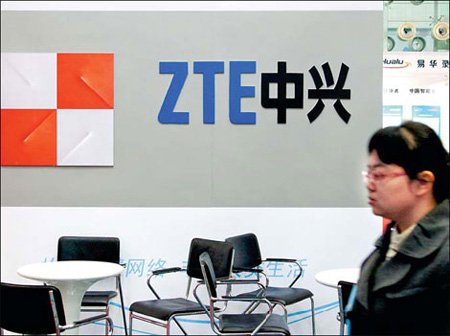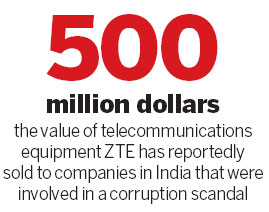ZTE sees little effect from ruling
Updated: 2012-02-09 09:59
By Shen Jingting (China Daily)
|
|||||||||
|
 |
|
The exhibition booth of ZTE Corp, China's second-largest telecommunications equipment maker, at the 12th China (Tianjin) Information Technology Exposition in November. [Photo / China Daily] |
Chinese companies won't make major strategy changes after Indian court's move on licenses
BEIJING - ZTE Corp, China's second-largest telecommunications equipment maker, said an Indian court's ruling imposing penalties on local telecoms operators has had little impact on its performance, and the company's operations in India are running as usual.
Earlier this month, the Supreme Court of India revoked 122 telecommunications licenses that were issued at below-market prices in 2008 amid a corruption scandal, the India-based Economic Times reported.
The newspaper said Andimuthu Raja, the former telecoms minister, had resigned because of the case and was in jail awaiting trial.
The ruling applies to licenses for eight operators, some of which are held by joint ventures involving foreign companies such as Telenor ASA of Norway and Emirates Telecommunications Corp of the United Arab Emirates.
Media reports have said that many operators had purchased equipment from Chinese vendors Huawei Technologies Co Ltd and ZTE Corp.
Huawei and ZTE, both among the world's top five telecommunications equipment companies, have invested heavily in India in the past decade.

That nation is the world's second-largest cellular market by subscribers, with 894 million at the end of December.
In a statement to China Daily on Wednesday night, ZTE said the Indian court's ruling hadn't had a great effect.
"Our company will pay close attention to the progress, and continue to expand in India's telecom market," it said.
ZTE's Hong Kong-listed shares gained 3.44 percent to HK$22.55 ($2.90) on Wednesday.
Huawei declined to comment on Wednesday. According to Huawei's official website, the company has invested about $200 million in India.
It established its largest overseas research and development center, Huawei Technologies India, in Bangalore, in 1998.
The Economic Times reported that Huawei had sold nearly $800 million worth of second-generation gear to the companies involved in the case, while ZTE had sold equipment worth $500 million. The paper did not reveal the source of its figures.
Chinese analysts said that Huawei and ZTE might not come away unscathed, but the corruption scandal would not force Chinese companies to make a major strategy change in India.
Zhao Hailin, an analyst with the research house IHS iSuppli Co, said that since many of the affected Indian operators had applied for credit from banks, it meant that banks would shoulder more risks than Chinese equipment makers.
In addition, Huawei and ZTE had definitely received at least part of their payments due, Zhao said.
"Because of intensified competition and the low pricing environment (in India), we have seen Huawei and ZTE experience a sliding revenue contribution from India over their global sales since 2008," Zhao added.
In the first half of 2011, Huawei generated the equivalent of 3 billion yuan ($476.3 million) while ZTE gained 1.8 billion yuan in revenue from India, data from IHS iSuppli show.
Revenue growth in India has been slower than in other markets, such as Europe.
"It is inevitable for companies such as Huawei and ZTE to encounter various risks when they expand overseas," said Chen Jinqiao, deputy chief engineer at the China Academy of Telecommunications Research.
"The smart way for Chinese companies is to adopt concrete methods to avoid risks, rather than retreat quickly when a problem occurs."
- China's CPI rises 4.5% in Jan
- More expensive coffee in Starbucks
- Euro debt crisis 'creates opportunities'
- Postal service revenue jumps 22%
- Maserati to recall 222 autos in mainland
- Beijing office rents not yet to rival NY
- China's auto exports hit record high in 2011
- China raises asoline and diesel prices








